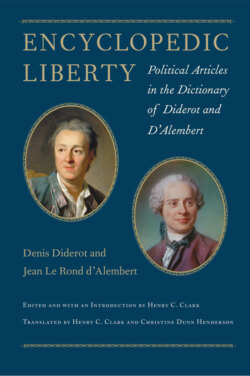Читать книгу Encyclopedic Liberty - Jean Le Rond d'Alembert - Страница 20
На сайте Литреса книга снята с продажи.
Оглавление[print edition page 22]
[print edition page 23]
Brownists †
(Brownistes)
BROWNISTS (Ecclesiastical history), name of a sect that formed out of the Puritans’ sect about the end of the 16th century: it was named after Robert Brown, its leader.
This Robert Brown, who wrote many books to support his views, was not, as Moréri claims, a schoolmaster from Southwark, but a man of good mores, and even learned. He was from quite a good family in Rutlandshire and was allied to the Lord Treasurer Burleigh. He did his studies at Cambridge and began to publish his opinions and rail against the ecclesiastical government in Norwich in 1580, which attracted the resentment of the bishops. He himself took pride in having been for this reason put in thirty-two different prisons—all of them so dark that he could not make out his hand in them, even in broad daylight. Afterward, he left the realm with his co-religionists and retired to Middleburg in Zeeland, where he and his followers obtained permission from the Estates1 to build a church and worship God in their own way. A short time later, division arose in his little flock. Many split off, which so disgusted Brown that he resigned his office, returned to England in 1589, abjured his errors, and was raised to the position of rector in a Northamptonshire church. He died in 1630.
Brown’s move led to the ruin of the Middleburg church, but the seeds of his system were not so easy to destroy in England. Sir Walter Raleigh, in an essay composed in 1592, already counts upward of twenty thousand persons imbued with Brown’s opinions.
[print edition page 24]
It was not over articles of faith that they broke off from other communions, but because of ecclesiastical discipline, and especially the form of government in the Anglican church—of which the Brownists strongly disapproved, though without adopting that of the Presbyterians, since they assigned equal blame to the consistories and the synods, the bishops and the ministers. They did not want to join any reformed church, since they said they were not assured of the sanctity and regeneration of the members of those churches, because the latter put up with sinners and communicated with them—which, according to the Brownists, was the height of impiety. They condemned the solemn celebration of marriage—which they said was merely a civil engagement, and thus needed the intervention of only the secular magistrate, not at all the ecclesiastical. Nor did they want children to be baptized by Anglican priests or Presbyterian ministers, whom they did not regard as members of the church, and who, they added, took no care of those they had baptized. They rejected every kind of prayer, saying that the Lord’s Prayer ought not to be regarded as a prayer but merely as a model for a prayer that J. C. has given us. See SEPARATISTES and NON-CONFORMISTES.
They established an ecclesiastical government of democratic form. When one of their churches was assembled, whoever wanted to be incorporated into their society made a profession of faith and signed a form by which he committed himself to follow the Gospel in the same sense as they did. The power to admit or exclude members, and to decide all conflicts, belonged to the entire society. They selected their officers and ministers from among themselves to preach and care for the poor. These ministers were established and their different functions were distributed to them by the fasting, prayer, and laying on of hands of some members of the society—without, however, their believing that they possessed the title or dignity of ordination. For they sometimes reduced their ministries to the status of the laity—persuaded that in this regard, they could destroy their own work. And since they taught that a church was only an assembly of a certain number of persons in the same place, they therefore believed that the power of the minister appointed in that place was so limited to it that he could neither administer communion nor baptize nor exercise any other function in a church other than his own. All members of the sect, even the laity,
[print edition page 25]
were permitted to make exhortations2 to the assembly, to propose questions after the sermon, and to debate what had been preached. In a word, each Brownist church was an assembly in which each member had the freedom to strive for the general good of the society without being accountable for his actions before any superior, synod or tribunal. The independents who formed themselves afterward from among the Brownists adopted a portion of these opinions. See INDEPENDENTS.
Queen Elizabeth actively went after this sect. Under her reign, the prisons were full of Brownists; there were even some hanged. The ecclesiastical commission and the Star Chamber raged against them with such vigor that they were obliged to leave England. Many families retreated to Amsterdam, where they formed a church and chose Johnson for pastor, and after him, Aynsworth, known for a commentary on the Pentateuch.3 Also counted among their leaders: Barrow and Wilkinson.4 Their church was maintained for about a hundred years. (G)
